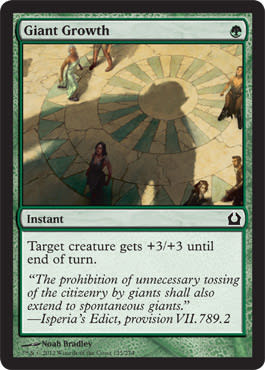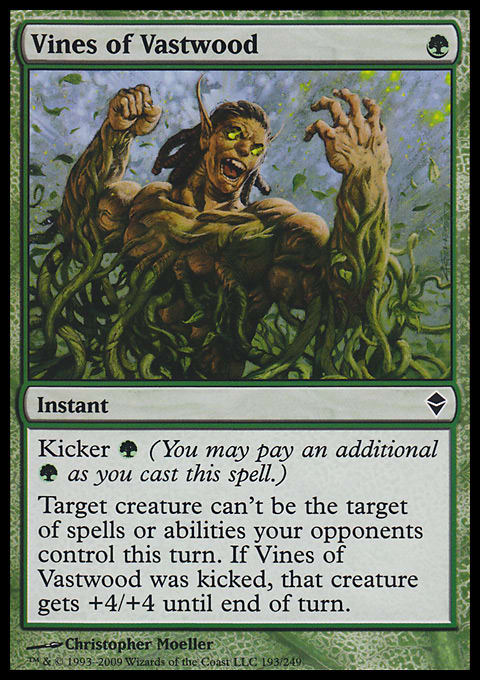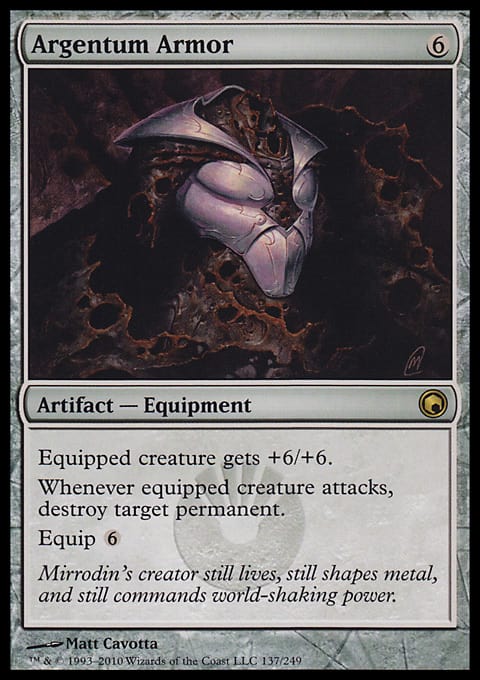The power of the pump spell was something no one ever had to explain. From my first game of Magic, the idea that a card could surprise your opponents and make a creature suddenly bigger was obviously powerful. Giant Growth was a no-brainer, going into most decks that could produce ![]() . Even as more and more cards were produced, the pump spell held a place of power. I had a deck at one point that ran four Muscle Bursts and four Diligent Farmhands!
. Even as more and more cards were produced, the pump spell held a place of power. I had a deck at one point that ran four Muscle Bursts and four Diligent Farmhands!
Even now, there are articles out there proclaiming the power of pump spells. You see pump spells in everyone’s decks at prereleases, and pump spells are still picked highly in Drafts. Pump spells are powerhouses in the game, and I still run them regularly in my multiplayer decks.
Considering the power of pump spells, I thought I would do an article listing the top twenty pump spells. I e-mailed several friends and other writers for their opinions on pump spells. I was shocked by the responses:
Bennie Smith: I rarely use pump spells in multiplayer outside of something like Berserk (since you can kill an opponent's attacking creature while dealing massive surprise damage to another opponent) or Tainted Strike . . .
Darryl Bockett: I really favor Equipment over pump spells, because I am way too biased in favor of cockroach-style cards. Pump works sometimes as kill in mono-green decks and the like, but I usually want a little more value.
Adam Styborski: Temporary pumps are nice, but I want to make more than just a one-shot commitment.
These were just a few of the responses. By and large, everyone agreed that a pump spell, in and of itself, just wasn’t good enough to include in a multiplayer deck. How could this be? I’d always believed that a pump spell was a solid card! The articles I’d read extolled the virtues of the pump spell. How had the card sunk so low in the minds of players who regularly play against more than one opponent at a time?
Pumped Up
Before going any further, I should define what I mean when talking about pump spells. Even among longtime players and players whom I play with on a regular basis, the definition of what a pump spell is varies from player to player. I can only imagine the variety of definitions all of you have for pump spells! There are even a number of newer players who don’t even know what a pump spell is (congrats to you for hanging in up to this point!).
Pump is Magic slang used when a creature grows bigger than the stats in the lower-right corner of the card indicate. Most ways to pump a creature involve pumping the power and toughness by the same amount or pumping only the power. There are some cards that pump only the toughness of a creature. I suppose jacking up the junk in the trunk of a creature is pumping the creature, but I don’t remember seeing players use those cards and referring to it as “pumping,” so I can’t be sure.
A pump spell is a spell that pumps a creature. The most obvious, iconic, pump spell is Giant Growth. This card defines what a pump spell is. No one would try to tell you this is not a pump spell.
There are several variations to the defining pump spell that are still viewed as pump spells:
- Instants that pump the power but not the toughness (Howl from Beyond) of a creature;
- Sorceries that pump a creature (Monstrify);
- And spells that pump a creature by adding +1/+1 counters to a creature (Hunger of the Howlpack).
The first real question when defining pump spells involves multiple creatures. Is a card like Overrun a pump spell? Most people I talked to viewed it as a pump spell, but not in the standard understanding of the term. It “pumps” your creatures, but pumping “all” your creatures seemed like “more” than a pump spell.
Permanents that pump creatures for a turn (Wild Defiance) brought even more questions. Some players question whether that is still a pump spell. For these players, a defining aspect of a pump spell is that it is used once and then discarded. “One and done” does seems to be a defining description for a pump spell for many players. That Wild Defiance can be used again and again doesn’t seem to fit into most player’s definitions of a pump spell.
For the sake of the rest of this article, I’ll be including all of the cards discussed to this point as pump spells. This may not match your definition, but go with me on this, at least until the end of the article.
We move even farther from a pump spell when looking at permanents that give a constant bonus to a creature or group of creatures. Rancor and Honor of the Pure both “pump” creatures, but their permanence takes them outside the definition of pump spells. One person I spoke to even described cards that give -X/-X as pump spells! As far as I know, he is the only person who defines pump spells in that way.
When Is It Time to Pump Up the Volume?
Many players are like Bennie Smith, preferring to reserve the use of pump spells to those times when an opponent can be eliminated. The pump spells most preferred for these players are the ones that provide a dramatic power boost or some way to bring the required amount of damage to a more manageable number. Berserk and Tainted Strike are two options that have already been mentioned. Another commonly used pump spell is Double Cleave. While it doesn’t provide a specific bump to a creature’s power, the ability to do twice the damage makes it very effective.
Although it lands outside of our definition of a pump spell, Kessig Wolf Run is another card commonly used in these situations. While being a permanent should remove the element of surprise, it is amazing how often the players involved forget that Kessig Wolf Run is an option!
While the players I talked to were against pump spells, their attitudes softened if the spell offered something more. Cards like the previously mentioned Berserk and Kessig Wolf Run or even Colossal Might offer a pump and trample, allowing your bigger creature to take full advantage of their new size. Mighty Leap offers a modest size jump and flying. Pump spells alone are too often neutralized by a single blocking creature. The preferred pump spell tends to have something extra that solves that problem.
It isn’t just extras that deal with speed-bump blocking creatures. Vines of Vastwood and Stonewood Invocation are both commonly seen pump spells. The extra something on these cards is the hexproof/shroud they offer your creature. With these spells, and most pumps spells that are used by players I spoke to, the pump is the extra something. Vines of Vastwood is nice, but players use it to keep their creature safe, with the +4/+4 as an extra bonus if it makes sense. Briarhorn gives you an entire bonus creature!
Darryl’s statement that his pump spells tend to be permanent was something that is echoed by many casual players. Using the spell one time just doesn’t offer enough value to make it worth it in a game with multiple opponents that will probably still be going after turn one. Daryl mentioned Equipment as his choice of permanent pump. Even here, we see the need for something extra. Bonesplitter is cute, but Loxodon Warhammer, Argentum Armor, or any Sword of X and Y is preferred. Most players are willing to pay a little extra to receive the bonus again and again.
Permanence doesn’t have to mean Equipment. Many players suggested that pump spells that give +1/+1 counters were worth playing. Increasing Savagery was a pump spell many players could get behind.
The value gained from a permanent always in play can also be found in reusable spells. Rancor offers a different kind of permanence, in that it just seems to always come back. Elvish Fury isn’t particularly great value when buying it back repeatedly, but it does offer permanence in its own way.
Another form of pump spell that most players are willing to use is the mass-pump spell. Overrun is the most frequently mentioned card in this category, which demonstrates that even here, value is king. If the card were to cost 1 less but not give trample to each creature, would it still be used? Probably not. The trample aspect is what gives the card something extra. Trample ensures that you are probably killing off at least one opponent when you cast Overrun.
Lovin’ the Pump
There was one player I spoke to who continued to use the one-shot pump spells that I believed were so valuable. Andy, formerly of CommanderCast, still wanted his pump spells to give him more than just the pump, but he sees a value in these pump spells that the others were not seeing.
Andy enjoys the multiplayer aspect of the game as much as I do. Attempting to play your opponents against each other is as much a part of Magic for us as the color pie. When we look at cards, we tend to see where cards would shine in multiplayer games. In one-on-one games, pump spells are almost exclusively used on your own creatures. There are situations in which you would want to pump an opponent’s creature, but they are rare. Not so in multiplayer.
When an opponent is attacking another opponent, the value of a pump spell shines. The opportunity to mess with combat math and see several creatures die after careful blocks are made is a wonderful thing! This use is not available if you are using Equipment to pump creatures. Cards that give +1/+1 counters are great when only your creatures are targets, but if you are trying to help get rid of a particularly annoying creature, you may not want to be giving your opponents’ creatures permanent bonuses.
Conclusion
No one disagrees that upping a creature’s power and toughness for a turn is a good thing. The problem lies in the cost. For many playing multiplayer Magic, using up mana and a card just to receive that boost for one turn simply isn’t enough value for the cost. The pump spell needs to do more than simply give a bonus to a creature for a turn. With the options described above, settling for anything less is a mistake. I would encourage you to use a variety of pump spells in your deck. Permanence, surprise, and multiplayer mischief are all valuable in a deck. Running a variety of pump spells will give you all those options, and keep your opponents off-balance.
Bruce Richard





























